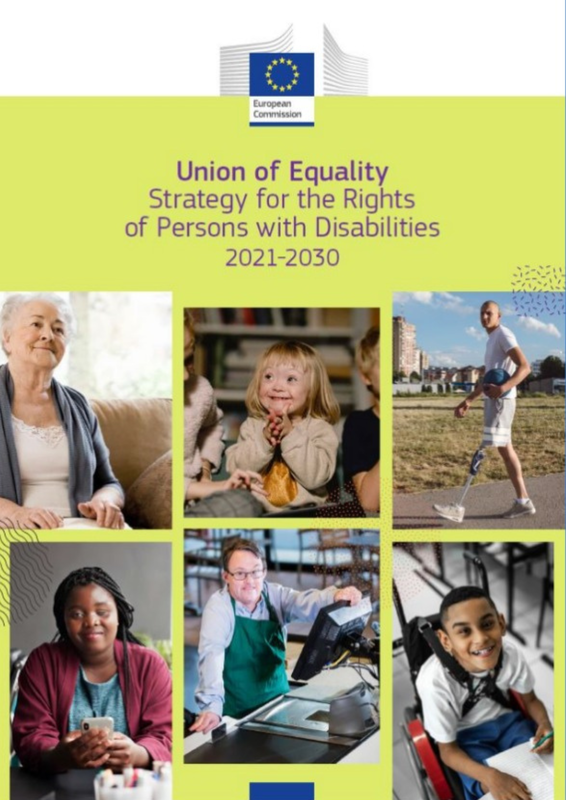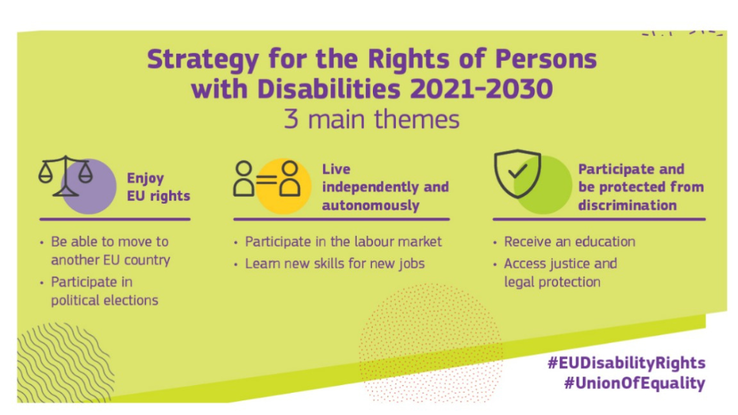2021-2030 EU Strategy for Disability
|
The European Commission has published its Strategy for the Rights of Persons with Disabilities 2021-2030 to ensure their full participation in society.
The aim is to contribute to the implementation of the European Pillar of Social Rights for which an Action Plan will be adopted by the Commission this week, which serves as a compass for employment and social policies in Europe. The strategy supports implementation by the EU and its Member States of the United Nations Convention on the Rights of Persons with Disabilities at both EU and national levels. Enhancing equal participation and non-discrimination The ten-year strategy sets out key initiatives around three main themes:
|
- Independent living and autonomy: Persons with disabilities have the right to live independently and choose where and with whom they want to live. To support independent living and inclusion in the community, the Commission will develop guidance and launch an initiative to improve social services for persons with disabilities.
- Non-discrimination and equal opportunities: The strategy aims to protect persons with disabilities from any form of discrimination and violence. It aims to ensure equal opportunities in and access to justice, education, culture, sport and tourism. Equal access must also be guaranteed to all health services and employment.
It is impossible to participate in society on an equal basis with others when your environment – physical or virtual – is not accessible. Thanks to a solid EU legal framework (e.g. the European Accessibility Act, Web Accessibility Directive, Passenger rights) access has improved, however, many areas are still not covered by EU rules, and there are differences in the accessibility of buildings, public spaces, and some modes of transport. Therefore, the European Commission will launch a European resource centre ‘AccessibleEU' in 2022, to build a knowledge base of information and good practices on accessibility across sectors.
Delivering the strategy: close cooperation with EU countries and mainstreaming in internal and external policies
Delivering on the strategy's ambitions will require a strong commitment from all Member States. EU countries are key actors in the implementation of the UN Convention on the Rights of Persons with Disabilities. The Commission will establish the Disability Platform, bringing together national authorities responsible for implementation of the Convention, organisations of persons with disabilities and the Commission to support implementation of the strategy and to enhance cooperation and exchange on implementing the Convention. The Platform will have a comprehensive online presence and ensure continuity of activities throughout the year. Persons with disabilities will be part of the dialogue and part of the process of implementing the Strategy for the Rights of Persons with Disabilities 2021-2030.
The Commission will integrate disability matters into all EU policies and major initiatives. Because the rights of persons with disabilities do not end at Europe's borders, the Commission will promote the rights of persons with disabilities globally. With this strategy, the EU will reinforce its role as an advocate for the rights of persons with disabilities. The EU will use instruments such as technical assistance and financial programmes, support via EU delegation, political dialogues and work in multilateral fora to support partner countries in their endeavours to implement the UN Convention on the Rights of Persons with Disabilities and provide guidance to implement the SDGs in a disability inclusive manner.
With this plan, the European Commission wants to make sure that all people with disabilities can enjoy their rights and have the same chances in life as everyone else. To make this happen, in the next 10 years the European Commission will work to make sure that all people with disabilities can:
- Move and live freely in any country of the European Union.
- Get the right support to be able to have a good life.
- Live independently. They should not live in institutions away from their familiesand friends.
- Be part of the community together with other people.
- Make their own decisions about their lives. For example, they have the right to decide where, how and with whom they want to live.
- Have the same chances to study and work as all other people.
- Have access to health care and other important things and services.
- Are treated in a fair way and with respect. They should not be left out or be treated badly because they have a disability.
Progress achieved
Go to the Monitoring Framework to check the results achieved and the actions in progress.



